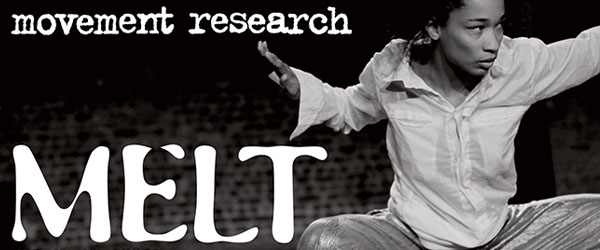Critical Correspondence
Moving Dialogue: Notes on “Thanks for the Poncho”
Cristiane Bouger
The showing presented by Romanian choreographer Mădălina Dan at Dance Theater Workshop was part of Movement Research’s Moving Dialogue: A Bucharest/New York Dance Exchange and represented the culmination of her work-in-progress developed during a two-week residency at DTW studios.
In her program notes, Mădălina Dan tells us about the embarrassing diplomatic incident which occurred in 1997, when then American President Bill Clinton thanked Romanians for the “poncho” after receiving a flag without the coat of arms of Communism on its center. The hole on the flag symbolized the fall of dictator Nicolae CeauÅŸescu and the Communist regime in 1989.
So it was not a surprise that a post-communist Romanian flag could be seen as soon as we entered into the theater, which had its technical structure revealed and the audience lights constantly on. Mădălina Dan was warming up on the stage wearing studio working clothes and a girly pink prop on her head.  A pair of boxers were hung on the back wall. Other objects like a cup of coffee, paper money, a tissue box with a green skull printed on it, an onion, a blouse, and a trash bin were disposed on the stage. A laptop from which Dan played the soundtrack of the performance stood on a stool on the right side of the house, close to the audience.
After some minutes, Dan asked the audience: “Do you have any expectations?”. Silence. She kept warming up. She took her sneakers off with the help of a spectator and threw them across the stage. At some point, with scissors in her hand, she looked at the audience and pointed them towards the fake money. She cut the dollar bills and placed them in the trash bin. She cut off a piece of her hair and did the same. She stood beside the hanging underwear, but did not cut it. She walked across the stage, started to cut her blouse but then gave up. She poured coffee on herself and looked doubtful and comic. She asked to the audience: “Do you still have any expectations?”. The question would be invoked once more. At a certain point she asked for a volunteer. A woman came to the stage and the performer and the spectator sat on the floor side by side while Dan unpeeled an onion. She gave it to the woman who kept the work going. The performer faked crying.
Thinking about Clinton’s incident, Dan refers to the objects and the immediate connotations people attribute to or associate with them, when unaware of its symbolic historicity or meaning. In that sense, in an ideal scenario, the objects she set on the stage would constitute a platform for the creation or recoding of significance.
The objects were placed isolated at specific locations, not belonging to anywhere but simply co-existing by appearing in the same visibility, which was defined by the parameters of the stage. The performer connected one object to another, emphasizing or discarding their original function. In moving from one spot to another, Dan left traces of her unfinished or discarded actions, which also informed a temporal relation to those objects and to the scene. Cutting, or not, the objects with her scissors and attributing other functions to these objects played with the attempt to question, to create or to subvert expectations. A certain tension between action and no action was also established in the sense that Dan opted to perform a non-choreographic score or for the fact that she was absent from the stage in specific moments. Still, the performer’s actions seemed not to be enough. The performer moved with physical laxness and the timing of her actions vanished swiftly before we could build up any meaning or relation. Consequently, there was no subversion or reevaluation of our relationship to the established meaning of those objects.
Coherence between signifier and significance has been subverted, stretched and rearranged in many ways in the encounter of different cultures or interdisciplinary fields. Dan tapped into a rich terrain and presented some potentially good ideas, which were discarded too quickly, but not vigorously enough to make a statement.
Nevertheless, it is possible to recognize a latent force on the structure MădălinaDan brought to the stage. Considering Thanks for the poncho. was as a work-in-progress developed during two weeks of residency, it is easy to understand that the investigation has just started to unfold. ¾
——-
Thanks for the Poncho. by Mădălina Dan was presented on October 28, 2010 in a shared evening with Vava Ştefănescu at Bessie Schönberg Theater/ Dance Theater Workshop, in New York City.
Movement Research, Dance Theater Workshop, Romanian Cultural Institute in New York, Gabriela Tudor Foundation and National Dance Center Bucharest were institutional partners in the Moving Dialogue Exchange program.
Cristiane Bouger is theater director, dramaturge, writer, performer and video artist. She lives and works in Brooklyn, New York. She is one of the writers of Moving Dialogue: A Bucharest/New York Dance Exchange.



